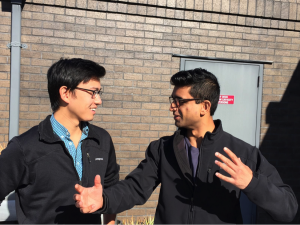“At a venture capital firm, you’re working 12 a.m. to 12 a.m. – there’s no set 9 a.m. to 5 p.m. schedule,” said Zavain Dar ’10, a senior associate at Lux Capital, a New York-based venture capital firm.
This flexibility in their schedules gave Dar and his colleague Nan Li, an investment partner at Investment Endeavors, the opportunity to teach at Stanford this winter. Dar and Li are teaching Symbolic Systems 161, a brand new course titled “Applied Symbolic Systems in VC and Entrepreneurship”. The class was met with great excitement, and had a waitlist of 40 students despite its capacity being doubled from 30 to 60.

The idea for the class started when the two were talking last fall at Innovation Endeavors, a venture capital firm run by former Google CEO Eric Schmidt. The two had endless conversations and debates about the similar histories of artificial intelligence (AI) and venture capitalists, and soon the pair were unknowingly cultivating the curriculum for their class. Dar explained that the class, in many ways, is a continuation of the conversations that the two had.
“Today, AI has moved from hard-coded logic to statistically-driven correlation independent of reason,” Li said, paralleling the history of artificial intelligence with that of venture capital firms. “Today, VCs think in terms of logic.”
Dar and Li will apply their theory and try to predict the future trends of venture capital firms.
The pair’s academic interests and experiences contribute heavily to the nature of the class. Li, who holds a BSE in computer science from the University of Michigan, explained that his interests in CS led him to product management.
“My interest was not so abstract, so I always try to find ways to apply technology in a more practical way,” he said.
“I was on the complete opposite spectrum of Nan,” Dar said. “I was all over the place.”
Dar wasn’t initially interested in computer science because he didn’t want to just memorize syntax. He felt the major didn’t allow him to think creatively. Dar has a B.S. in Symbolic Systems and a M.S. in Theoretical Computer Science and was in the Philosophy and Logic program. He enjoyed the process of developing theories and trying to prove it. They both bring their own views and experience to the classroom.
“[The class environment] is relaxed, like chatting over a beer,” Dar said, describing a free-form and relaxed classroom environment where students are encouraged to challenge views.
Unlike a math class where you have concrete answers, SYMSYS161 doesn’t have absolute truths. The main goal of the class is to encourage public discourse and debate.
“It’s more of a conversation than a lecture,” Dar said.
Taking their investment philosophy to the classroom, Dar and Li are grounded in creating a thesis and proving it. “It’s all about proving your axioms and the truths,” Dar said. Li added that as an entrepreneur or investor, you’re always challenging assumptions and trying to create your own worldview. “The more different your worldview is and the more correct it is, the more you’re rewarded for it.”
They praise Stanford’s technologically forward mindset and hope to take it back to their venture capital firms.
In terms of students trying to pitch their idea to the investors, Dar and Li aren’t too worried. “It’s a pass/fail class,” Dar said. “The most important part thing is showing participation and engagement.
“But, if the student has enough gumption to pitch their idea, we would like to see a final paper applying the course’s themes,” Dar added.
Looking back at their time in college, Dar and Li remember the teachers who breathed passion and were genuinely excited in the underlying theory, “like someone fascinated by a piece of art,” Dar said. The two emphasized that college as a critical time for personal growth. After college, there’s a lack of structure, Dar explained. “If you don’t have a passion for something, you’ll probably be lost.”
Dar and Li are grateful for the opportunities they had at their alma maters to discover their passions and interests. For example, at Stanford, Dar was a member of Basmati Raas and remembers dancing 20 hours a week. Li was president of Eta Kappa Nu at Michigan. Both agree that curiosity and passion are the common currency that will fuel you in life. “There’s no linear path, but it’s more of an outcome,” Li explained of getting to where they are today.
Dar and Li post their course slides online to their class website for anyone to view to invite anyone to learn and participate in the discussion. They also want to be held accountable by their students. “If we post slides that are just patently false, not only the students can see that, but the broader Silicon Valley can see it as well,” Dar said.
The new teachers are only in week four of the quarter, but hope to continue to teach after the quarter ends.
You can follow @ZavainDar and @NanLi on Twitter and use #SymSys161 to learn more about the course and join the conversation.